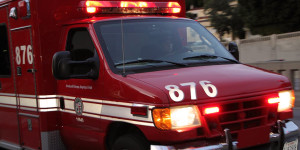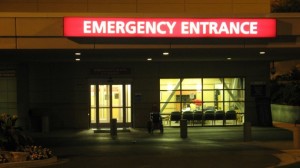by Nick Romaniello -
 With bugout bags, get home bags, EDC, etc, preppers tend to organize many go-to kits for various emergency scenarios. The prepper mentality is largely one of self-reliance, but what happens when injury or health emergency force you to rely on someone else? Do they know everything they should? I have recently experienced a few scenarios, both directly and indirectly, within my own family where medical emergencies rendered a person unresponsive. Without going into too much personal detail, one scenario had me alone with a person who lost consciousness from a drug interaction. Training had allowed me to avoid panic and react properly. A call was placed to 911 and information was conveyed in a calm clear way to assist responders as much as possible. When paramedics arrived on scene, the quest for information continued and I found myself suddenly unable to answer all the questions. “What medications does this person take?” “Who is their Primary Care Physician?” “We are taking them to So and So hospital, do you know the way?” I was suddenly at a disadvantage. A disadvantage that affected this persons effective treatment. What could I do to prevent this disadvantage in the future?
With bugout bags, get home bags, EDC, etc, preppers tend to organize many go-to kits for various emergency scenarios. The prepper mentality is largely one of self-reliance, but what happens when injury or health emergency force you to rely on someone else? Do they know everything they should? I have recently experienced a few scenarios, both directly and indirectly, within my own family where medical emergencies rendered a person unresponsive. Without going into too much personal detail, one scenario had me alone with a person who lost consciousness from a drug interaction. Training had allowed me to avoid panic and react properly. A call was placed to 911 and information was conveyed in a calm clear way to assist responders as much as possible. When paramedics arrived on scene, the quest for information continued and I found myself suddenly unable to answer all the questions. “What medications does this person take?” “Who is their Primary Care Physician?” “We are taking them to So and So hospital, do you know the way?” I was suddenly at a disadvantage. A disadvantage that affected this persons effective treatment. What could I do to prevent this disadvantage in the future?
Pregnant women are often the most prepared for a sudden departure to a hospital or birthing center. They know they will be going, but just aren’t sure when. So they get prepared. When “it’s time” they just pick up and (relatively) calmly go, knowing that they will have everything they need. The truth is that we all may be on our way to the hospital and just don’t know when. Remember that “it’s not if, but when” mentality of being prepared and pack a small bag for each household to be grabbed in the event of a medical emergency. When a person is rushed to the hospital (especially if they are unable to speak) you will have important information and gear that will make the difference.
 While I’m sure there are resources out there that discuss this type of prep, I haven’t come across any. Based on my personal experiences alone, I would recommend the following to be included in such a kit:
While I’m sure there are resources out there that discuss this type of prep, I haven’t come across any. Based on my personal experiences alone, I would recommend the following to be included in such a kit:
- Prescription Information: This includes a list of all current medications, dosage amounts, usual times they are taken, and prescribing doctors contact information.
- Over-the-Counter or Natural Remedy’s: If the subject is taking anything that may react with prescriptions being taken or medications that may be administered in hospital the ER should be alerted.
- Allergy Information: If the subject has any allergies to medication, food, latex, etc.
- Copies of ID: Drivers license, organ donor information, insurance card, and a list of important phone numbers.
- Personal Essentials: If the subject wears glasses, dentures or anything else needed to function normally be sure to either include spares in the bag, or list a reminder to get them on the way out the door.
- Hospital Information: Depending on your location, there may be one or many possible destinations for an ambulance. A list of local ER’s with addresses, phone numbers and directions can help greatly when your mind is racing.
- Clothing and Personal Items: A change of clothes, a book, and some comfort items such as a family photo can bring some peace to a person facing an unexpected hospital stay. Perhaps include some snacks and a book for the person sitting in the waiting room holding the bag. Include dollars and coins for parking and vending machines.
For me this type of kit is a recent concept and is far less refined than the oft-discussed B.O.B. so I would welcome any additional information or ideas to help make the 911 bag, as I am calling it, a more effective piece of prepping gear. A rush to the hospital is never a pleasant experience, but being prepared can help alleviate stress and speed effective treatment.

Good information. And knowing first aid is very important too. We have recently had a couple of unexpected trips to the hospital with our accident prone son. (both pre-mealtime). Our local hospital is known for very long wait times unless you are dying on the floor. First visit we were caught out. Long, cold, hungry, boring wait. Second visit while my husband put our son in the car I grabbed a jumper/coat for each of us, an apple for us adults and raided the small change jar for some vending machine money for hot drinks. I also took a couple of his favourite books. We chose to go in my car which has a 3 day kit in the boot so I knew there was water in small bottles and extra food. This was a much more tolerable visit than the first.
Long waits are unfortunately the expectation at most hospitals (many hours sometimes). We’re preppers, it only makes sense to have a plan for this contingency also. Boredom, especially during stressful times in an unfamiliar environment, is very difficult to cope with. A good book and something in your stomach help to go a long way to make things feel more normal for you and your family (and your patient).